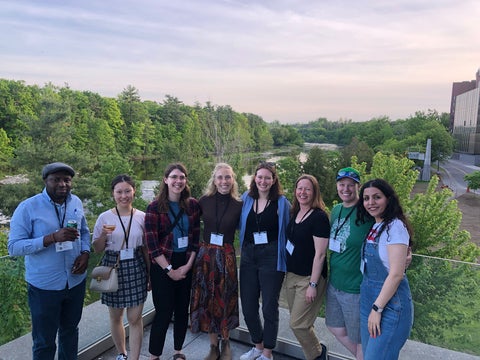
Dr. Maria Strack, Can-Peat principal investigator, attended the annual meeting of the Canadian Geophysical Union with her research group who presented on a wide range of peatland topics. Pictured (L-R), Oluwabamise Afolabi, Christina Bao, Marissa Davies, Emma Wegener, Miranda Hunter, Maria Strack, Meg Schmidt and Maryam Bayatvarkeshi).
The Canadian Geophysical Union (CGU; https://cgu-ugc.ca/) is a society with over 400 members that focus on the physical study of the Earth. Each spring, CGU hosts an annual meeting that serves as a venue to reconnect with colleagues in the geophysical sciences in Canada and share latest research results. It is also a supportive environment for students and early career researchers, providing the opportunity to network and practice science communication.
Can-Peat was well-represented at this year’s meeting, held May 26–29, 2024 in Ottawa, ON. Maria Strack, the Can-Peat principal investigator, co-chaired a session with Nigel Roulet and Tim Moore (McGill University) and Peter Whittington (Brandon University) on “The biogeochemistry and ecohydrology of pristine and disturbed peatlands”. At the session, Can-Peat partner Kelly Bona (ECCC) gave the opening talk about estimating greenhouse gas emissions from peatland disturbance in Canada’s oil sands region. Can-Peat researchers, Fereidoun Rezanezahad and Philippe van Cappellen also organized a session entitled “Cold region wetlands and peatlands in a changing climate: Science and Management” in which invited speaker Sarah Finkelstein (University of Toronto) enlightened the audience about the important carbon stocks in peatlands on the Boreal Shield in Ontario and the critical stewardship provided by the Moose Cree First Nation in the French River watershed. Can-Peat researcher Oliver Sonnentag (Université de Montréal) also presented an invited talk about his long-term research at Scotty Creek and the rapid recovery of carbon uptake in peatlands post-fire.
This year’s CGU meeting was held jointly with the annual meeting of the Canadian Society of Agricultural and Forest Meteorology. These sessions, alongside several others with a focus on hydrology, biogeochemistry, and ecosystem modelling, providing an exciting opportunity for Can-Peat participants to share first results of their research. For example, Kara Webster presented a poster on priorities for peatland data collection in Canada based on the results of the June 2023 Global Peatland Iniative workshop “Building collaborations for effective peatland management in Canada” co-organized by Can-Peat and the Peatland Ecology Research Group.
Can-Peat trainees were also active at the meeting. Postdoctoral fellow, Marissa Davies (University of Waterloo), shared results on fuel management treatments in peatlands and their potential to reduce ecosystem and soil carbon emissions. She also presented her research aimed to improve our understanding of boreal peatland recovery following disturbance by geological exploration. Katie Hettinga, an MSc student also at University of Waterloo, shared her Can-Peat research investigating the use of remote sensing derived estimates of peatland net ecosystem exchange of carbon dioxide.